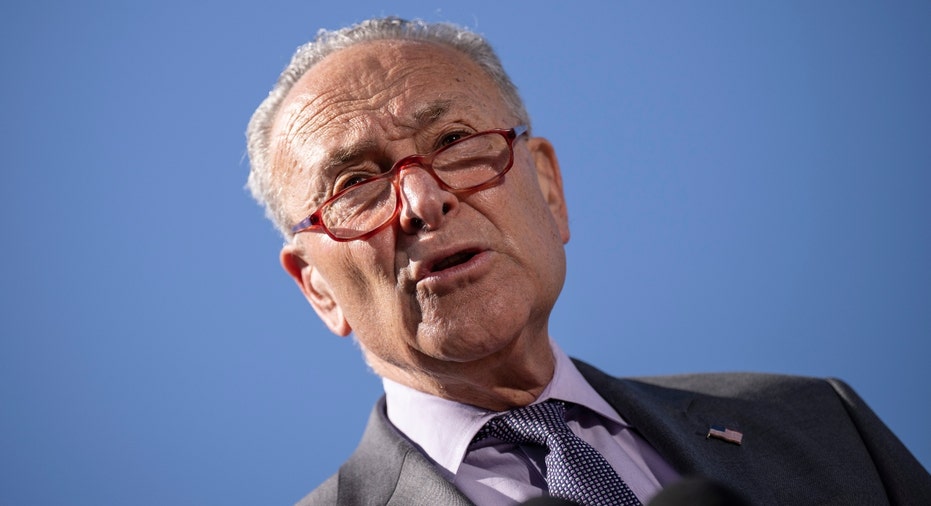Senate barrels toward vote to avert railroad strike with fate of paid sick leave unclear
Senate likely to vote on cooling off period, paid sick leave amendments, says Sen. John Thune
How Congress can ‘solve’ the rail problem
Brotherhood of Railroad Signalmen President Michael Baldwin discusses Congress' involvement to avoid a rail strike, arguing a strike is the 'last thing' the industry wants.
The Senate on Thursday is moving toward a vote to avoid a looming railroad strike, which has the potential to cause significant economic damage in the U.S. right before the holiday season if lawmakers do not act.
"As a matter of process and timing and everything like that I still think it probably comes together today," Senate Minority Whip John Thune, R-S.D., told reporters.
Thune said the Senate appears to be moving to a vote on a bill the House passed Wednesday which imposes upon unions a contract agreement that was negotiated in September. That agreement, which has already been approved by eight transportation unions, would grant workers three unpaid sick days as long as the employers were provided with at least 30 days' notice before the time was taken. Four transportation unions, compromising nearly 100,000 rail workers, say the deal is unfair and threatened a national strike unless the agreement is broadened.
The GOP whip also said the Senate would likely vote on two amendments to that bill. One, which passed the House Wednesday separately from the base agreement, includes seven more days of paid sick leave for workers. The other, Thune said, would extend a cooling-off period between management and workers to come to an agreement.
BIDEN'S PUSH TO AVERT RAIL STRIKE SPLITS GOP, DEMOCRATS IN SENATE

The Senate is moving toward a potential vote on Thursday to avert a rail strike. (Photo by Mario Tama/Getty Images / Getty Images)
The Senate has not officially scheduled any vote or announced a deal on when to vote on averting the strike, however. Additionally, Thune noted time agreements were still being worked out -- though he thought they would result in a vote Thursday.
"I think most of our members would support that. The question is will any Democrats." Thune said of the cooling-off period. "And I've talked to a few who also sort of agree that this isn't something that Congress ought to be doing and would rather have the parties negotiate it out. But whether or not there's enough support to pass it at 51 or at 60, those are all open questions."
However, Sen. Joe Manchin, D-W.Va., one of the most moderate Democrats in the Senate, appeared cool to the idea Thursday. He said it would be reasonable if the sides were close to an agreement, but would not make sense if they are "not close."
Manchin also emphasized that "we cannot have a strike on our railroads" and backed President Biden's proposal to keep railroads running through the House bill.
HOUSE PASSES BIDEN-BACKED BILL TO AVERT RAIL STRIKE
More information on thresholds for the amendment votes was expected Thursday, according to Thune. However, Sen. John Cornyn, R-Texas, said he does not think the seven days of paid sick leave provision can pass with 60 votes.
Sen. John Thune, R-S.D., predicted Thursday the Senate will vote on a bill to avert a rail strike. | AP Newsroom
"The decision that has to be made by Senator Schumer, how we can vote on both the underlying bill and how we can vote on the sick leave provisions separately," Cornyn said. "My opinion is that the sick leave provisions won't get 60 votes."
Schumer said Thursday his top priority is to have a paid sick leave vote.
If the sick leave does not make it through the Senate, a key dynamic will be whether Democrats can muster the votes to get the underlying bill through. Thune said Thursday he expected Democrats to "deliver a lot of votes." Additionally, Sen. Richard Blumenthal, D-Conn., seemed reluctant to say Democrats would tank the bill if they do n'ot get the sick leave they want.
CLICK HERE TO GET THE FOX BUSINESS APP
"I think there is a lot of commitment to solving this problem before it has a potentially disastrous economic effect," he said. "But I think we need to push for fairness and basic justice in terms of sick leave."
If a strike were to happen, it could cost the U.S. economy billions of dollars per day.
Fox News' Kelly Phares contributed to this report.























